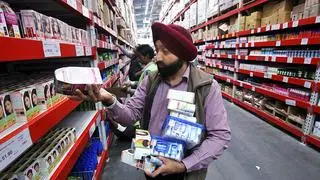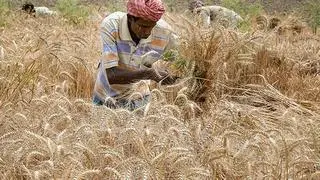On agriculture, the Economic Survey 2013-14 begins on an ominous note, expressing its concern over the possible impact of El Nino on food prices.
However, it ends on a positive note, saying “there appears to be no cause for alarm on the El Niño front” with regard to foodgrain availability, with record domestic production and “huge stocks in the central pool”.
This year, the weather department has estimated below normal monsoon at 93 per cent of the long period average.
Sowing delayedTill June, rainfall was deficient by 43 per cent. As a result, kharif sowing is been delayed and the total area planted was lower by 43 per cent at 182.4 lakh hectares till July 4.
Overall, while suggesting a big push to modernisation and liberalisation in agriculture, the Survey is in favour of creating a national common market and phased shifting to direct transfer of fertiliser-food subsidies, as also changes in the Acts on APMC, Essential Commodities and Land Tenancy.
Futures trading vitalStating that farmers must have the same economic freedom to buy and sell their produce as do other producers, it says “commodity futures trading is essential for a modern food sector as it generates forecasts about future prices that shape sowing and storage decisions across the country.”
The Survey also proposes a shift to direct cash transfer system or food stamps to meet the needs of the people which, in turn, could reduce the fiscal deficit.
Asserting that fertiliser subsidy “hurts everyone: farmers, firms, taxpayers, and consumers”, it says “the distorted policy has also led to stagnation of private investment in the sector, especially in urea, and increased reliance on imports.”
Incidentally, Fertiliser and Chemicals Minister Ananth Kumar had said in the Lok Sabha on Tuesday that the Government had no plans to hike urea prices. In a possible pointer to the Union Budget, the Survey proposes direct marketing and contract farming, inclusion of agri-related taxes under the Goods and Services Tax and a stable trade policy based on tariff interventions.
States’ roleTo improve foodgrain availability and cut food subsidy, the Survey urges the Government to encourage States to buy wheat and rice instead of depending on the Food Corporation of India alone.
“There is a need to expand the adoption of decentralised system of procurement for the PDS from 11 States and Union territories at present to all States,” it added.







Comments
Comments have to be in English, and in full sentences. They cannot be abusive or personal. Please abide by our community guidelines for posting your comments.
We have migrated to a new commenting platform. If you are already a registered user of TheHindu Businessline and logged in, you may continue to engage with our articles. If you do not have an account please register and login to post comments. Users can access their older comments by logging into their accounts on Vuukle.